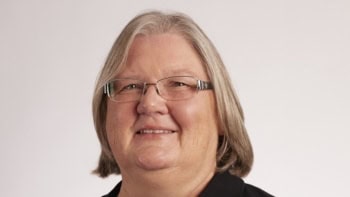With so much spin, jargon and fake news, it can be hard to know what businesses are really up to. James McKenzie finds that hearing a company’s vision first hand is key to understanding its potential

I have mentioned many times in this column the value of the business awards given by the Institute of Physics (IOP), which have benefited more than 70 physics-based firms in the UK and Ireland since they were introduced eight years ago. You may also remember me saying how in 2018 the IOP expanded the business awards so there was a new prize for start-up firms. We felt it was vital to support early-stage businesses, which had often been unable to provide sufficient evidence of commercial growth to be recognized by existing awards.
The following year we added another award, specifically for very-early-stage companies taking innovative products into the medical and healthcare sector. Financed in perpetuity by a generous donation from Ann and Mike Lee, who had founded the UK-based firm Research Instruments in the early 1960s, the £5000 Lee–Lucas award was given for the first time earlier this year to two new firms: Cellular Highways and Nebu~Flow.
Traditionally, the IOP hosts a reception at the Houses of Parliament in London where all business-awards winners can showcase their products and technology (space permitting) to funding-agency executives, senior industrialists and politicians. The winning firms are also invited to the IOP awards dinner, get highlighted by the IOP’s marketing and social-media teams, get to speak at relevant IOP meetings, and take part in the events run by the IOP’s Business Innovation and Growth (BIG) group.
Nothing makes the companies’ potential come alive more than hearing directly from their founders and chief executives
As part of this year’s BIG group virtual summit, founders and chief executives from the winning businesses were able to explain their technology, its applications and their firms’ visions at two webinars held in July. In fact, the BIG group’s recent online talks, seminars and workshops have been attended by more people than ever went to our past physical events. I’m sure in future that the online and physical events will run in parallel.
This year’s 13 award winners, which were announced in July, are working on a wide variety of “deep-tech” physics-based research and innovations covering everything from quantum computing, compound semiconductor magnetic sensors and acoustic-nebulizer technology to magnetics technology and novel imaging solutions. As the IOP’s vice-president for business, I’m chair of the judging panel and it’s one of the most satisfying aspects of the role. Joined by a group of IOP fellows and others with a track record of bringing physics-based innovation to market, our work always involves lively discussion. But nothing makes the companies’ potential come alive more than hearing directly from their founders and chief executives. Indeed, it was inspiring to hear such passionate and capable entrepreneurs from the award-winning companies at the BIG group webinars sharing their firms’ vision and potential.
Take the presentations by the two inaugural Lee–Lucas award winners. Cellular Highways – represented by founder Samson Rogers – is a Cambridge-based start-up that develops microfluidic devices for rapid cell sorting, while Nebu~Flow – represented by founder Elijah Nazarzadeh – is a University of Glasgow spin-out that is commercializing an acoustic nebulizer based on surface-acoustic-wave devices.
Conditions such as asthma and chronic obstructive pulmonary disease kill one person in the UK every five minutes on average and, as Nazarzadeh pointed out, current drug treatments suffer from a significant flaw: the medication doesn’t always reach the right part of the patient’s lungs. Nebu~Flow’s technology tackles this problem by using controlled surface acoustic waves to create smaller droplets.
In pre-clinical trials, the device boosted the efficiency of absorption of a common asthma drug, salbutamol, from 60% to 90%. To get the best results, the tiny battery-powered device will require a disposable drug cartridge, which is a great business model. Unlike its competitors, Nebu~Flow can also deliver more drug types including vaccines. Its future looks particularly bright given COVID-19, with 29 out of the 45 or so treatments under development expected to be delivered in this way.
As for Cellular Highways, its VACS (vortex-actuated cell sorting) technology works by generating a transient vortex in a microfluidic channel; this vortex flows downstream with a cell to be sorted, thereby gently deflecting it across the streamlines. Each deflection event lasts for 23 μs, making VACS the fastest chip-based cell sorter to date. Scalable, sterile cell sorting of this kind – vital for cell therapy and regenerative medicine – has long been in demand but never previously been possible. Its technology should also be valuable for virus and vaccine research.
The COVID-19 crisis underlines the importance of finding ingenious, practical and timely solutions to the world’s most challenging problems
One of the main business-award winners – Promethean Particles – has seen strong interest related to COVID-19. As its founder Ed Lester explained, the company uses a continuous hydrothermal synthesis process and advanced fluidics technology to make nanomaterials at 1% of the cost of conventional methods. The firm has already built a full-scale volume production facility to produce tonnes of the materials, but it’s the applications for such materials that are intriguing. Copper nanoparticles, for example, are great as antimicrobial and antiviral agents and can be added to textiles and a range of surface coatings.
Indeed, the COVID-19 crisis underlines the importance of finding ingenious, practical and timely solutions to the world’s most challenging problems. And as many of the IOP’s award winners illustrate, plenty of those innovations are firmly rooted in physics. Research and development will be critical as society and the economy recover from COVID-19, enabling us to build a greener, healthier and more resilient world. The IOP’s business-award winners are well placed to contribute to that endeavour.
- The BIG seminar on 23 September, which will examine how close quantum technology is to market, will include two other IOP business award winners: Orca and QLM



